


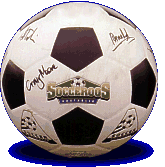


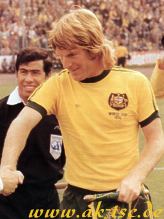
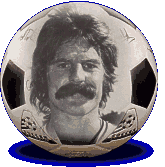

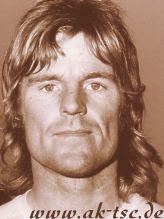 This page
reflects the life of Peter Wilson and was made to show the people around the world some
highlights of his fantastic football days and the years before and after that.
This page
reflects the life of Peter Wilson and was made to show the people around the world some
highlights of his fantastic football days and the years before and after that.
Peter Wilson dominated the Australian Soccer scene in the years 1969-1982. After the Football World Cup 1974 in Germany, a few European Newspapers called him the Beckenbauer of Australia. Wilson never reached the elegance of the German class player, but he was well known, not just within Australia but beyond as well, as a hard, uncompromising, but never dirty player. He was a thumping header of the ball and tackled ferociously.
One of his proudest moments came in 1974, leading the Aussies – the Socceroos - into the World Cup battle. There he was, tossing the coin with that great German Franz Beckenbauer, watched by tens of millions all around the globe. In a later game he led an heroic defensive action against East Germany, one of his best games ever. After the Cup he got rich offers from clubs in England and Germany, but he decided to stay in his Australia.
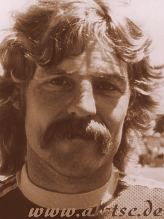 Despite his birth in England and migration to Australia as a
20-year-old, for many years after his career had ended, he said that the captain of the
Socceroos should be Australian-born. But players swore by the strength of his leadership.
He was not only the captain of the Green and Gold, but also when representing his State of
New South Wales, as well as his club. But off the field, he was a quiet, shy, and
unassuming person.
Despite his birth in England and migration to Australia as a
20-year-old, for many years after his career had ended, he said that the captain of the
Socceroos should be Australian-born. But players swore by the strength of his leadership.
He was not only the captain of the Green and Gold, but also when representing his State of
New South Wales, as well as his club. But off the field, he was a quiet, shy, and
unassuming person.
Only once in the last century, Australia reached the World Cup, and in a team of fantastic players, Wilson was one of the best. After his playing days had ended, he became a reclusive person. For many years now, no one has managed to take a photo of him or get an interview. He lives in the mountains near Wollongong,south of Sydney in NSW.
| 1947 | Born on the 15. September 1947 in Felling,
England, as Frederick Peter Wilson. Felling is an industrial suburb of Gateshead, which is on the south side of the river Tyne close to Newcastle in north-east England – a region famous in England for producing fine footballers |
| 1966 | Commenced his football career with the Junior Team of FC Middlesbrough in April. |
| 1968 | Played his only game in the first Team of FC Middlesbrough in February against Charlton Athletic. Transferred in the northern summer of 1968 to Gateshead Football Club |
| 1969 | Arrived in Australia in January. Played his
first game for his new club - South Coast United - on the 19 January in Nowra in a Test
against HMAS. Albatross Naval Base. Won the Championship of the New South Wales State League with South Coast |
| 1970 | Played his first game for an Australia selection
against Kowloon Bus Company, Saigon, South Vietnam. Played his first A International game for Australia against Iran in Teheran. Fourth place with South Coast at the Ampol Cup |
| 1971 | Played his first game as captain of Australia. Transferred to Marconi Fairfield at the end of the season for $AUD6,000 |
| 1972 | Runner-up of the New South Wales State League. Winner of the Interstate Grand Final – the unofficial National Championship of Australia. Transferred to Safeway United (the new name for South Coast) at the end of the season for $AUD12,500 |
| 1973 | Captained Australia in the qualifiers for the Soccer World Cup in Germany and won the Asia/Oceania group |
| 1974 | Captained Australia in all three Group Phase
games in the Football World Cup in Germany Transferred to Western Suburbs at the end of the Season for $AUD9,000 |
| 1976 | Won the Ampol Cup with Western Suburbs against
Hakoah Eastern Suburbs. In October in China, Wilson earnt his 49th cap, sharing the most-capped honour with Manfred Schaefer. Wilson earnt his 50th cap on 3rd November in Tel Aviv vs. Israel to set a new record. Another personal highlight for him in that game, he scored in a 1:1 draw. |
| 1979 | Played his Last A International for Australia against New Zealand. Led his Country for the 61th time as a Captain. Finished in third place with Western Suburbs in the Ampol Cup. |
| 1981 | Australian coach Rudi Gutendorf tried with no success to get Wilson back in to the National Team for the World Cup Qualification game against New Zealand. Australia loses to New Zealand, and NZ qualified for the 1982 WC Finals in Spain – only the second time a team from the Oceania Football Confederation has made the Finals. |
| 1982 | Was injured for most of the Season. Took over APIA as a coach. In the last game of his career, he won the Australian Cup Final in Melbourne as a player/coach. |
| 1983 | Wilson wanted to play a last Season with the Wollongong, but APIA demanded $AUD10,000 as a transfer fee. Wilson finished his active playing days |
| 1993 | After 18 years of Wilson’s record standing, Paul Wade became Australia’s most capped player. Wilson held his Record for 6224 Days |
| 1997 | First reunion of the 1974 Australian World Cup Team in Wollongong. Peter Wilson was the only player who did not attend. |
| 2000 | In Sydney a street was named after him, the "Peter Wilson Street". Wilson did not come to the inauguration. |
